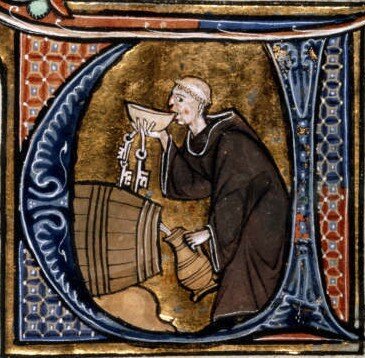Healthy Drinkers

Alcohol has had an important impact on medicine in various ancient cultures.
Alcohol is generally credited as being the oldest drug in human history. Personally, I'm a little bit skeptical of that claim, because it takes some technology, or at least luck, to make alcohol in a drinkable form, whereas plenty of hallucinogenic compounds are readily found in nature and are just waiting to be consumed by mistake by a foraging primate. My own uncertainty aside, there's no question that alcohol is probably the most widely used and abused drug in history, as well as the one which has had the most impact on cultural development. For all its importance to modern Western society's social mores and culinary arts, alcohol has also had an important impact on medicine in various ancient cultures. There have been a surprisingly large number of papers published in the last twenty years on the topic of alcohol's historical place in medicine, but the other day I came across this one, so although I've looked at a few other ones to verify that they seemed to be making many of the same points, it's the one I'm sharing with you, despite the fact that the English clearly isn't perfect. The article gives a lot of wonderful historical information about how different alcohols appeared in different cultures, which might add a lot of depth and richness to any campaign setting, but for my part I'll restrict myself to discussing the medical aspects.
The creation and consumption of alcoholic drinks probably goes back at least ten thousand years. In that time, alcohol has been seen as a cure-all and a deadly poison, and as anything in between. To some, it was thought to be the drink of the gods themselves. To the ancient Egyptians, beer was apparently a staple part of the usual diet, being thought of as a sort of "liquid bread" of great nutritional value. Beer was a major part of the diet of Egypt's pyramid-building slaves, which actually makes a lot of sense; it was cheap to produce, safer than much of the drinking water, high-calorie to provide energy for moving stone blocks, and probably kept the slaves happier. Richer Egyptians mastered the art of combining their beer with other plants, and evidence suggests that they invented beers with narcotic and hallucinogenic effects as well as the more predictable ones.
The ancient Greeks believed that wine was a pure and rejuvenating fluid, while beer was "corrupted" by adding yeast. "Pure" wines, probably with alcohol contents much higher than modern wines, were thought to prolong life and youth, although ironically the powerful alcohol taken in ritualistic binges probably took years off the lives of many drinkers. Beer was thought to weaken the body and make men effeminate, which makes me wonder what they would have thought of modern Superbowl commercials. Wine and mead, but not beer, figure heavily in early Greek medical texts, probably because beer was perceived as unhealthy.
Because of its mood-altering effects, alcohol was often thought to have supernatural powers, and given how poorly we understand the brain's neurotransmitter system, calling it "magic" arguably isn't that big a step down from our current understanding of how it affects the body. Dionysian worship often included alcohol drinks, which were known to mostly induce euphoria but occasionally cause madness.
As far as its use as a medicine, alcoholic drinks at one time or another were believed to cure pretty much any illness you could name. The health benefits of alcohol probably came from its euphoriant and analgesic effects, since, after all, when you had a few shots, you felt less sick. Different types of beers were believed to cure parasites, accelerate wound-healing, and strengthen the blood vessels, while other medicines were believed to be more effective (and probably easier to keep down) if mixed with alcohol. Beer was even the treatment of choice for various gynecological diseases, although I can only hope that I wasn't applied topically. The Greeks and Egyptians both particularly favoured a form of barley beer which they called zythos, which also appears in the Jewish Talmud, as a miraculous regulator of digestion and regularity. The Talmud goes on to state that wine is the best of all medicines, although to its credit, it does note that this is only true if it is taken in moderation. Alcohol was, most understandably, used in many cultures as a way of controlling pain. Although not an especially effective pain remedy, alcohol was the best that many societies had. Since many cultures mixed various herbs into their medical booze, it's quite likely that some of them were unknowingly prescribing themselves antibiotics and opiate pain killers.
I like to make alcohol something interesting in my games. Given the richness and variety of alcoholic drinks which humanity has had, and the importance which they've had on history and society, it seems a shame if every tavern just serves the same beer and if nobody really gives much thought to how alcohol fits into this kingdom or that church. Of course, as with so many things one can say about ancient medicine, it all becomes much less important in a world with ready access to healing magic, but it by no means becomes unimportant.
More than four years ago, Dr. Eris Lis, M.D., began writing a series of brilliant and informative posts on RPGs through the eyes of a medical professional, and this is the one that appeared here on November 23, 2018. Lis is a physician, gamer, and author of the Skirmisher Publishing LLC OGL sourcebook Insults & Injuries, which is also available for the Pathfinder RPG system.






